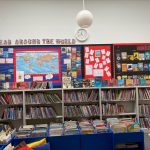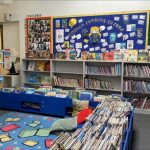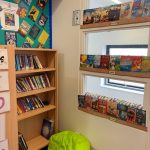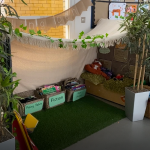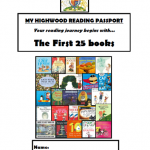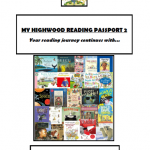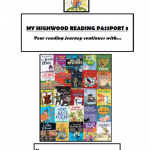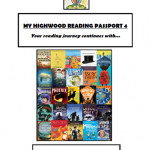Intent
Reading lies at the heart of Highwood, we believe it is the foundation for future success and underpins our entire curriculum. We believe that reading is an essential life skill and we are committed to enabling our pupils to become lifelong readers who are passionate about books.
Through the teaching of systematic phonics, our aim is for pupils to become fluent readers by the end of Key Stage 1. Pupils will focus on developing their fluency and comprehension as they move through the school, via discussion and guided reading, throughout all subjects.
We place high value on oracy, encouraging our children to read aloud and share their views in a language-rich environment.
It is our intention to ensure that, by the end of their primary education; all pupils are able to read fluently, with confidence and will develop a lifelong love of reading for pleasure or purpose.
(Please see our Parents tab- support your child page for further information and ways to support your child.)
Implementation
At Highwood Primary School, we ensure that our Reading planning follows a clear progression of skills and ensures that there is full coverage of ‘The National Curriculum programmes of study for English 2014’ and ‘The Statutory Framework for Early Years Foundation Stage 2021’. The curriculum is adapted and extended to match all pupils’ needs and builds upon their prior knowledge and skills. We endeavour to practise Reading skills in all subjects across the curriculum, appreciating that they are the fundamental building blocks for learning as a whole.
Early Years
Reading at Highwood begins in Early Years where children’s spoken language is enhanced through conversation and a language-rich environment, including listening to and responding to high quality texts. Pupils are read to daily and are encouraged to participate by echoing back and repetition of familiar stories. Through a variety of text types, conversation, storytelling and role play, pupils will become confident at using more complex vocabulary and language structures. Reading for pleasure, as a class, is highly promoted.
Phonics
Phonics is taught daily and is introduced through the Read Write Inc (RWInc) programme to get children off to a flying start with their English. RWInc is a method of learning based upon letter sounds and phonics, and we use it to aid children in their reading and writing.
Rapid, early coverage of phonic knowledge and skills will allow the pupils to have a firm foundation for decoding going into Key Stage 1 where explicit phonics teaching will continue. Teachers will use the strategies of segmenting and blending, and then moving to segmenting words using knowledge of prefixes, root words and suffixes.
As children move through Key Stage 2, phonics teaching will continue to be explicitly taught in the Autumn term in Year 3. Fluent reading is modelled through echo reading and shared reading of whole class and group texts in Guided Reading, English and Foundation lessons and class readers.
Children with reading difficulties are identified early through regular half termly assessments, being supported one-to-one or in a small, guided group.
Guided Reading
Pupils are encouraged to read in a small, ability-banded group with the class teacher, where quality texts are selected to challenge. Decoding and fluency are supported, and comprehension and vocabulary is discussed.
Throughout both Key Stages, regular opportunities to read aloud are offered through Reader’s Theatre, choral reading, presentations and both fiction and non-fiction texts.
Guided Reading lessons include a combination of teacher-led work, follow on activities, comprehension activities, independent reading and sometimes to simply read for pleasure. Throughout these carefully planned lessons, all children have access to the same book, vocabulary and discussion, and are given the opportunity to work alongside their peers to enhance their reading skills further.
In Key Stage One and Two, we have a skills-based approach to reading using VIPERS, which is an acronym to aid the recall of the 6 reading domains as part of the reading curriculum. They are the key areas which we feel children need to know and understand in order to improve their comprehension of texts.
- Vocabulary
- Inference
- Prediction
- Explain
- Retrieve
- Summarise
Throughout Key Stage 2, Guided Reading takes place four times a week, where children will develop their comprehension of carefully selected, relevant, high-quality texts, covering a variety of genres, and where they are supported to become confident, competent readers. Through quality first teaching, we teach our pupils to be inquisitive, thought-provoking readers, which allows them to enjoy asking questions about the texts they are reading, and, at the same time, gain a deeper understanding of what they have read through challenging and enjoyable texts.
We are fortunate enough to have a school library, as well as a team of dedicated librarians from Year 6. Teachers utilise the library in a variety of ways, using it to support their English lessons but also to enhance reading in the foundation subjects, for example, retrieving factual information to support children’s understanding of what life was like in the Victorian era. The librarians also enjoy the responsibility of organising the library at break times so that children are able to come and enjoy reading in a quiet area. We also have a weekly book club where children are invited to listen to and share their favourite books.
Each year group has an exciting reading area which include a range of high quality texts and novels, as well as topic focus texts to support reading in the wider curriculum. Children are given daily opportunities to read a variety of materials in school, whether this be in lesson time, lunch time, or reading regularly with an adult. As well as children reading daily, we also recognise the importance of children being ‘read to’ and having the opportunity to be able to sit and listen to a ‘storyteller’. With this is mind, staff read daily to the children and use this opportunity to show their passion about books and read some of their favourite novels while getting into character using intonation and expression.
Reading for pleasure and Home Reading
Every child is given a home reading book that they can take home and enjoy in their own time. We encourage all children to read daily, though many children exceed this. Our expectation is that a family member listens to their child read their book and makes a comment in their child’s school reading record.
In Reception and KS1, all children are given a decodable reading book which is carefully matched to the phonic level they are working at. The books vary in several ways, including layout, size, vocabulary and length – this ensures children are provided with a rich diet of literature. We feel it is a fundamental aspect that all children are given books matched directly to their phonic knowledge as this allows them to rehearse and consolidate previously taught sounds without being exposed to unfamiliar phonemes. In turn, this allows children to flourish in their reading and become confident, accurate and fluent readers.
Celebrating and promoting Reading in Highwood
Children are rewarded for their regular reading at home and a Reading Certificate is presented to children in our weekly Achievement Assembly if they have excelled in their reading.
We promote Highwood’s 100 Best Books; our children are encouraged to work through our reading passports in each key stage, achieving a Reading Passport Certificate on completion of each Reading Passport.
Every March, we take part in ‘World Book Day’ to celebrate reading. We also hold different events within school to promote a love of reading and to raise its profile e.g. Sponsored Reads.
Year 6 Reading Ambassadors are allocated to read with our younger children in Reception and KS1 this allows our children to take pride in helping our youngest learners thrive by reading for pleasure and listening to older children share their reading as well as developing friendships.
Impact
As a result of quality first phonics teaching, pupils make continued progress from their starting points and are ready for the next stage in their education as they transfer through Early Years, Key Stage 1 and into Key Stage 2.
We have created a reading culture at Highwood Primary where:
- Pupils discuss what they are currently reading and books that have bought them pleasure and why.
- Pupils infer understanding from the books that they have read.
- Pupils are enthusiastic and motivated readers who are confident and enjoy reading a wide variety of genres and text types.
- Pupils are opportunities to succeed through scaffolded activities that allow all pupils to make progress.

